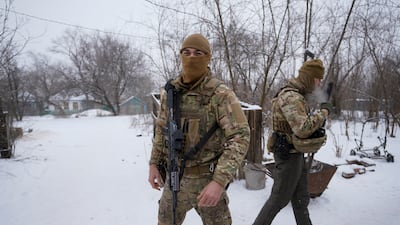Russian President Vladimir Putin’s deployment of more than 100,000 troops on the Ukrainian border has given him "multiple" invasion options, including the seizure of cities, Pentagon leaders said on Friday, warning of "horrific" destruction and "significant" casualties.
The stark assessment comes as Russia transmits mixed messaging on its intentions. Mr Putin earlier told French President Emmanuel Macron that he "did not want confrontation", yet Moscow's military build-up continues and Moscow has reportedly started shipping blood supplies to the Ukrainian border in apparent readiness to treat casualties.
"We don't believe that President Putin has made a final decision to use these forces against Ukraine,” Mr Austin told Pentagon reporters, noting that the Russian leader "clearly now has that capability".
“There are multiple options available to him, including the seizure of cities and significant territories, but also corrosive acts or provocative political acts like the recognition of breakaway territories."
The Pentagon chief said the US is "concerned about the range of options that he could pursue".
Gen Mark Milley, the top officer in the US military, said an invasion would result in "significant" casualties.
"And you can imagine what that might look like in dense urban areas, all along roads and so on and so forth. It would be horrific. It would be terrible," he told reporters.
The Pentagon has placed 8,500 US troops on heightened alert over the Ukraine crisis but has not deployed them outside the US.
Those troops would be sent to Eastern Europe if Nato activates its response forces.
“Even if and when we do move troops, the purpose of those troops – the point – would be to reassure allies or directly in support of Nato, or both,” Mr Austin said.
“The president has been clear about not employing troops in Ukraine for combat purposes.”
Russian officials have repeatedly denied planning to invade. But Moscow says it feels menaced by Kiev's growing ties with the West, especially following its seizure of Crimea and backing of separatist forces who took control of large parts of eastern Ukraine.
Mr Austin also held a series of calls on Friday and Thursday with his Polish, Romanian, German and French counterparts.
Another US arms shipment arrived in Ukraine on Friday, he said. The shipment is part of a $200 million Ukrainian military assistance package that President Joe Biden authorised in December.
That package includes Javelin anti-tank missiles, anti-armour weapons, grenade launchers, artillery and small arms as well as ammunition.
Reuters meanwhile reported that Russia's military build-up near Ukraine has expanded to include supplies of blood, along with other medical materials that would allow it to treat casualties, in yet another indicator of Moscow's military readiness.
Current and former US officials say concrete indicators — like blood supplies — are critical in determining whether Moscow would be prepared to carry out an invasion, if Mr Putin decided to do so.
The disclosure of the blood supplies by three US officials, speaking to Reuters on condition of anonymity, adds context to growing US warnings that Russia could be preparing for an invasion.
These warnings have included Mr Biden's prediction that a Russian assault was likely and US Secretary of State Antony Blinken's remarks that Russia could launch a new attack on Ukraine at “very short notice".
The Pentagon has previously acknowledged the deployment of “medical support” as part of Russia's build-up. But the disclosure of blood supplies adds a level of detail that experts say is critical to determining Russian military readiness.
“It doesn't guarantee that there's going to be another attack, but you would not execute another attack unless you have that in hand,” Ben Hodges, a retired US lieutenant general now with the Centre for European Policy Analysis research institute, told Reuters.
Russia's security demands, presented in December, include an end to further Nato expansion, barring Ukraine from ever joining and pulling back the alliance's forces and weaponry from Eastern European countries that joined after the Cold War.
Mr Putin said on Friday the US and Nato had not addressed Russia's main demands, but that Moscow was ready to keep talking.
Mr Biden told Ukrainian President Volodymyr Zelenskiy in a phone call on Thursday that Washington and its allies stand ready to respond decisively if Russia invades the former Soviet state, the White House said.
The US and its allies have said Russia will face tough economic sanctions if it attacks Ukraine.
Western countries have already imposed repeated rounds of economic sanctions since Russian troops seized and annexed Crimea in 2014.
But such moves have had scant impact on Russian policy, with Moscow, Europe's main energy supplier, calculating that the West would stop short of steps serious enough to interfere with gas exports.
Russia signalled on Friday that it could call a vote to prevent the UN Security Council from meeting publicly on Monday to discuss the build-up of Russian troops on the border.
"I can't recall another occasion when a Security Council member proposed to discuss its own baseless allegations and assumptions as a threat to international order from someone else," Dmitry Polyanskiy, Russia's deputy UN ambassador, posted on Twitter on Friday.
"Hopefully fellow [UN Security Council] members will not support this clear PR stunt shameful for the reputation of UN Security Council."











